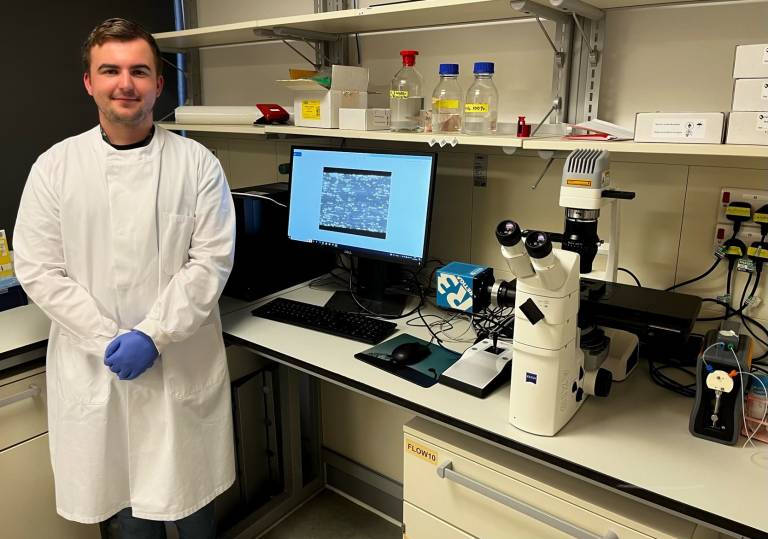Interview with Charlie Eales (Cardiovascular Science MSc Student 2022-23)
26 July 2023
Charlie Eales shares his experience of being a student on the MSc Cardiovascular Science programme at UCL's Institute of Cardiovascular Science.

What have you got out of the programme so far?
I came from a Pharmacology background and my undergraduate university research project focused on the cardiotoxicity of chemotherapy drugs. I am also was very passionate about certain cardiovascular diseases, so I knew that I wanted to study cardiovascular disease further as a Master's course. The programme provided further breadth and depth in cardiovascular science, which extended through to my research project.
Additionally, I wanted to go into the clinical aspects and the course provides clinical applications of cardiovascular science as well as scientific advances.
What are your plans next?
I have successfully secured a place in the NHS Scientists Training Programme specialising in Cardiac Science. After my undergraduate studies, my initial application was unsuccessful. However, completing this Master’s programme has solidified my career path and strengthened my application, leading to my success this time around.
This is a 3-year training programme within the NHS, which provides another Masters in Clinical Science and the opportunity to study further and practice work-based learning.
What do you like about the programme?
The programme has a wide range of students so it’s amazing to speak with and learn from others and to hear about their experiences, there’s amazing networking opportunities.
There’s a wide range of practical sessions ranging from the Fundamental genetic laboratory methods in cardiovascular research module which provides essential lab skills required for research into advanced genetic/molecular biology methods such as genetic screening, sequencing methods and molecular cloning, to the Congenital Heart Disease - Fundamentals, which provides exclusive hands-on experience studying human heart specimens and identifying cardiac morphology and defects. This module seamlessly linked the anatomical practical sessions with lectures on physiology and the developmental aspect of congenital heart diseases.
I wrote my research project proposal in term 1 and I started in the lab during term 2 (this early start is optional, by agreement between the student and supervisor), which provided vital experience for me and allowed me to be familiar with the protocols before starting full-time work on the project after exams in term 3.
Within the core module Heart and Circulation, we had the opportunity to make and present a poster about modelling Long QT Syndrome at a poster symposium. I was nervous before presenting but found it was a rewarding experience and my group even managed to receive the top poster prize. This experience was essential to developing my presentation skills, which is something that I now am grateful for as I am currently preparing for my research project presentation.
I am currently undertaking my research project with Dr Rens De Groot and Dr Adela Constantinescu-Bercu in the Haemostasis Research Unit within the Institute of Cardiovascular Science. Here, I am analysing blood samples from patients with Thrombotic Thrombocytopenic Purpura (TTP). In this disease clots/thrombi form within the microvasculature. These thrombi form as result of an increase in the ultra-large version of the protein Von Willebrand Factor (VWF), which binds to platelets and forms the micro clots. Also, VWF is cleaved into smaller multimers by the enzyme ADAMTS13. However, in TTP there is a deficiency in this enzyme, which results in microthrombi formation, leading to tissue death in acute crisis patients. Some patients are at risk of relapse following treatment. Hence, these patients require life-long monitoring.
Therefore, my project involves utilising a new assay, which can mirror how microthrombi form in real-time. My project method involves running the blood samples through a microchannel flow assay coated with collagen or an antibody against VWF, assessing the interaction of the fluorescently-labelled platelets within the channel and analysing the platelet surface coverage detected by the camera, alongside a few other exciting aims and objectives.
How did you find the teaching?
I felt the teaching was excellent overall and was clear in terms of structure of the modules and content, I also liked having the choice of optional modules in term 2.
I was happy to work one-to-one with academic staff and they genuinely do care about your experience on the course, supporting the ongoing continuous module development to ensure students were happy with how individual modules were being run. I am a course representative and am involved in meetings with academic staff and the procedures that are in place to raise and fix any issues, or to provide feedback if the requested change is not possible as to why.
I also had the opportunity for one-to-one support with help with writing and presentations, which helped with my ongoing academic development.
How did you find studying at the UCL Institute of Cardiovascular Science and London?
I like being at the forefront of cardiovascular research and the Institute of Cardiovascular Science and UCL have excellent facilities. There is always something going on in the main quad so I would recommend heading over there in your lunch break! Also, my family is based in London, so it’s great to be back! London has great transport, amenities and plenty of green spaces for sunny days.
Find out more about the Cardiovascular Science MSc at UCL.
 Close
Close

